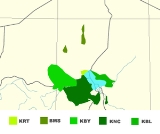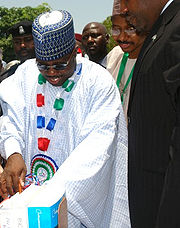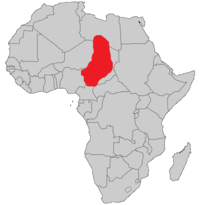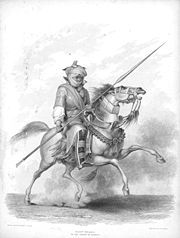
Kanuri
Encyclopedia



Africa
Africa is the world's second largest and second most populous continent, after Asia. At about 30.2 million km² including adjacent islands, it covers 6% of the Earth's total surface area and 20.4% of the total land area...
n ethnic group
Ethnic group
An ethnic group is a group of people whose members identify with each other, through a common heritage, often consisting of a common language, a common culture and/or an ideology that stresses common ancestry or endogamy...
living largely in the lands of the former Bornu Empire
Bornu Empire
The Bornu Empire was an African state of Nigeria from 1396 to 1893. It was a continuation of the great Kanem Empire founded centuries earlier by the Sayfawa Dynasty...
: Bornu
Borno State
Borno State is a state in north-eastern Nigeria. Its capital is Maiduguri. The state was formed in 1976 from the split of the North-Eastern State...
state in northeastern Nigeria
Nigeria
Nigeria , officially the Federal Republic of Nigeria, is a federal constitutional republic comprising 36 states and its Federal Capital Territory, Abuja. The country is located in West Africa and shares land borders with the Republic of Benin in the west, Chad and Cameroon in the east, and Niger in...
, southeast Niger
Niger
Niger , officially named the Republic of Niger, is a landlocked country in Western Africa, named after the Niger River. It borders Nigeria and Benin to the south, Burkina Faso and Mali to the west, Algeria and Libya to the north and Chad to the east...
, western Chad
Chad
Chad , officially known as the Republic of Chad, is a landlocked country in Central Africa. It is bordered by Libya to the north, Sudan to the east, the Central African Republic to the south, Cameroon and Nigeria to the southwest, and Niger to the west...
and northern Cameroon
Cameroon
Cameroon, officially the Republic of Cameroon , is a country in west Central Africa. It is bordered by Nigeria to the west; Chad to the northeast; the Central African Republic to the east; and Equatorial Guinea, Gabon, and the Republic of the Congo to the south. Cameroon's coastline lies on the...
. Those generally termed Kanuri include several subgroups and dialect groups, some of whom feel themselves distinct from the Kanuri. Most trace their origins to ruling lineages of the medieval Kanem-Bornu, its client states or provinces. In contrast to neighboring Toubou or Zaghawa pastoralists, Kanuri groups have traditionally been sedentary, engaging in farming, fishing the Lake Chad
Lake Chad
Lake Chad is a historically large, shallow, endorheic lake in Africa, whose size has varied over the centuries. According to the Global Resource Information Database of the United Nations Environment Programme, it shrank as much as 95% from about 1963 to 1998; yet it also states that "the 2007 ...
basin, and engaged in trade and salt processing.
Names and subgroups
Kanuri peoples include several subgroups, and identify by different names in some regions. The Kanuri languageKanuri language
Kanuri is a dialect continuum spoken by some four million people, as of 1987, in Nigeria, Niger, Chad and Cameroon, as well as small minorities in southern Libya and by a diaspora in Sudan. It belongs to the Western Saharan subphylum of Nilo-Saharan...
, which derived from Kanembu, was the major language of the Borno Empire Kanuri remains a major language in southeastern Niger, northeastern Nigeria and northern Cameroon but in Chad it is limited to handfuls of speakers in urban centers.
The largest population of Kanuri reside in the northeast corner of Nigeria
Nigeria
Nigeria , officially the Federal Republic of Nigeria, is a federal constitutional republic comprising 36 states and its Federal Capital Territory, Abuja. The country is located in West Africa and shares land borders with the Republic of Benin in the west, Chad and Cameroon in the east, and Niger in...
, where the ceremonial Emirate of Borno traces direct decent for the Kanem-Bornu empire, founded sometime before 1000 CE. Some 3 million Kanuri speakers live in Nigeria, not including the some 200,000 speakers of the Manga or Mangari dialect. The Nga people in Bauchi State
Bauchi State
Bauchi State is a State in northern Nigeria. Its capital is the city of Bauchi. The state was formed in 1976 when the former North-Eastern State was broken up...
trace their origins to a Kanuri diaspora.
In southeastern Niger, where they form the majority of the sedentary population, the Kanuri are commonly called Beri Beri ( a Hausa
Hausa language
Hausa is the Chadic language with the largest number of speakers, spoken as a first language by about 25 million people, and as a second language by about 18 million more, an approximate total of 43 million people...
name). The 400,000 Kanuri population in Niger includes the Manga or Mangari subgroup, numbering some 100,000 (1997) in the area east of Zinder
Zinder
Zinder is the second largest city in Niger, with a population of 170,574 by 2005 was estimated to be over 200,000...
, who regard themselves as distinct from the Beri Beri. Around 40,000 (1998) members of the Tumari subgroup, sometimes called Kanembu in Niger, are a distinct Kanuri subgroup living in the N'guigmi
N'guigmi
N'guigmi is a city and Commune of fifteen thousand in the eastern most part of Niger, very near to Lake Chad - lying on its shore until the lake retreated....
area, and are distinct from the Chadian Kanembu people
Kanembu people
The Kanembu are an ethnic group of Chad, generally considered the modern descendants of the Kanem-Borno Empire. The Kanembu number an estimated 655,000 people, located primarily in Chad's Lac Prefecture but also in Chari-Baguirmi and Kanem prefectures. They speak the Kanembu language, a variant...
. In the Kaour escarpment oasis of eastern Niger, the Kanuri are further divided into the Bla Bla subgroup, numbering some 20,000 (2003), and are the dominat ethnic group in the salt evaporation and trade industry of Bilma
Bilma
Bilma is an oasis town in north east Niger with a population of around 2,500 people. It lies protected from the desert dunes under the Kaouar Cliffs and is the largest town along the Kaouar escarpment...
.
Kanuri speak the Kanuri language
Kanuri language
Kanuri is a dialect continuum spoken by some four million people, as of 1987, in Nigeria, Niger, Chad and Cameroon, as well as small minorities in southern Libya and by a diaspora in Sudan. It belongs to the Western Saharan subphylum of Nilo-Saharan...
, or one of its related languages a member of the Nilo-Saharan language family
Nilo-Saharan languages
The Nilo-Saharan languages are a proposed family of African languages spoken by some 50 million people, mainly in the upper parts of the Chari and Nile rivers , including historic Nubia, north of where the two tributaries of Nile meet...
. Divisions include the Manga, Tumari, and Bilma dialects of Central Kanuri, and the more distinct Kanembu language
Kanembu language
Kanembu is a Nilo-Saharan language spoken in Chad by the Kanembu people. It is closely related to Kanuri.-References:Jouannet, Francis 1977. Essai d'inventaire phonétique du parler kanembou des Ngaldoukou du Sud-Kanem. Études phonologiques tchadiennes , pp. 129–143, Paris : SELAF.Jouannet,...
.
Inheriting the religious and cultural traditions of the Kanem-Bornu state, Kanuri peoples are predominantly Sunni Muslim.
In Chad, Kanembu speakers differentiate themselves from the large Kanuri ethnicity. The Kanembu are centered in Lac Prefecture
Lac Prefecture
This article refers to one of the former prefectures of Chad. From 2002 the country was divided into 18 regions.Lac was one of the 14 prefectures of Chad. Located in the west of the country, Lac covered an area of 22,320 square kilometers and had a population of 252,932 in 1993. Its capital was Bol....
and southern Kanem Prefecture
Kanem Prefecture
This article refers to one of the former prefectures of Chad. From 2002 the country was divided into 18 regions.Kanem was one of the 14 prefectures of Chad. Located in the west of the country, Kanem covered an area of 114,520 square kilometers and had a population of 279,927 in 1993. Its capital...
. Although Kanuri, which derived from Kanembu, was the major language of the Borno Empire, in Chad Kanuri language
Kanuri language
Kanuri is a dialect continuum spoken by some four million people, as of 1987, in Nigeria, Niger, Chad and Cameroon, as well as small minorities in southern Libya and by a diaspora in Sudan. It belongs to the Western Saharan subphylum of Nilo-Saharan...
speakers are limited to handfuls of speakers in urban centers. Kanuri remains a major language in southeastern Niger, northeastern Nigeria
Nigeria
Nigeria , officially the Federal Republic of Nigeria, is a federal constitutional republic comprising 36 states and its Federal Capital Territory, Abuja. The country is located in West Africa and shares land borders with the Republic of Benin in the west, Chad and Cameroon in the east, and Niger in...
, and northern Cameroon
Cameroon
Cameroon, officially the Republic of Cameroon , is a country in west Central Africa. It is bordered by Nigeria to the west; Chad to the northeast; the Central African Republic to the east; and Equatorial Guinea, Gabon, and the Republic of the Congo to the south. Cameroon's coastline lies on the...
.
In the early 1980s, the Kanembu constituted the greatest part of the population of Lac Prefecture, but some Kanembu also lived in Chari-Baguirmi Prefecture
Chari-Baguirmi Prefecture
This article refers to one of the former prefectures of Chad. From 2002 the country was divided into 18 regions.Chari-Baguirmi was one of the 14 prefectures of Chad. Located in the west of the country, Chari-Baguirmi covered an area of 82,910 square kilometers and had a population of 720,941 in...
. Once the core ethnic group of the Kanem-Borno Empire, whose territories at one time included northeastern Nigeria and southern Libya, the Kanembu retain ties beyond the borders of Chad. For example, close family and commercial ties bind them with the Kanuri of northeastern Nigeria. Within Chad, many Kanembu of Lac and Kanem prefectures identify with the Alifa of Mao, the governor of the region in precolonial times.
Originally a pastoral people, the Kanuri were one of many Nilo-Saharan groups indigenous to the Central South Sahara, beginning their expansion in the area of Lake Chad
Lake Chad
Lake Chad is a historically large, shallow, endorheic lake in Africa, whose size has varied over the centuries. According to the Global Resource Information Database of the United Nations Environment Programme, it shrank as much as 95% from about 1963 to 1998; yet it also states that "the 2007 ...
in the late 7th century, and absorbing both indigenous Nilo-Saharan and Chadic (Afro-Asiatic) speakers. According to Kanuri tradition, Sef, son of Dhu Ifazan of Yemen
Yemen
The Republic of Yemen , commonly known as Yemen , is a country located in the Middle East, occupying the southwestern to southern end of the Arabian Peninsula. It is bordered by Saudi Arabia to the north, the Red Sea to the west, and Oman to the east....
, arrived in Kanem in the ninth century and united the population into the Sayfawa dynasty
Sayfawa dynasty
Sayfawa dynasty or more properly Sefuwa dynasty is the name of the kings of the Kanem-Bornu Empire, centered first in Kanem in western Chad, and then, after 1380, in Borno ....
. This tradition however, is likely a product of later Islamic influence, reflecting the association with their Arabian origins in the Islamic era. Evidence of indigenous state formation in the Lake Chad area dates back to the early first century B.C. (ca. 800 B.C.) at Zilum.
Religion
Kanuri became Muslims in the 11th century, Kanem became a centre of Muslim learning and the Kanuri soon controlled all the area surrounding Lake Chad and a powerful empire called Kanem-Bornu EmpireKanem Empire
The Kanem Empire was located in the present countries of Chad, Nigeria and Libya. At its height it encompassed an area covering not only much of Chad, but also parts of southern Libya , eastern Niger and north-eastern Nigeria...
which reached its height in the sixteenth and seventeenth centuries when they ruled much of Central Africa.
Traditional state
Following the downfall of the Kanem-BornuBornu Empire
The Bornu Empire was an African state of Nigeria from 1396 to 1893. It was a continuation of the great Kanem Empire founded centuries earlier by the Sayfawa Dynasty...
Empire and the Scramble for Africa
Scramble for Africa
The Scramble for Africa, also known as the Race for Africa or Partition of Africa was a process of invasion, occupation, colonization and annexation of African territory by European powers during the New Imperialism period, between 1881 and World War I in 1914...
in the 19th century, the Kanuri were divided under the rule of the British
British Empire
The British Empire comprised the dominions, colonies, protectorates, mandates and other territories ruled or administered by the United Kingdom. It originated with the overseas colonies and trading posts established by England in the late 16th and early 17th centuries. At its height, it was the...
, French
French colonial empire
The French colonial empire was the set of territories outside Europe that were under French rule primarily from the 17th century to the late 1960s. In the 19th and 20th centuries, the colonial empire of France was the second-largest in the world behind the British Empire. The French colonial empire...
and German
German Empire
The German Empire refers to Germany during the "Second Reich" period from the unification of Germany and proclamation of Wilhelm I as German Emperor on 18 January 1871, to 1918, when it became a federal republic after defeat in World War I and the abdication of the Emperor, Wilhelm II.The German...
African empires.
Despite the loss of the Kanuri led state, the Shehu of Borno continues as ruler Emirate or Sultanate of Borno. This traditional Kanuri/Kanembu Emirate at Borno maintains a ceremonial rule of the Kanuri people, based in Maiduguri
Maiduguri
Maiduguri, also fondly called Yerwa by its locals, is the capital and the largest city of Borno State in north-eastern Nigeria. The city sits along the seasonal Ngadda River which disappears into the Firki swamps in the areas around Lake Chad...
, Borno State
Borno State
Borno State is a state in north-eastern Nigeria. Its capital is Maiduguri. The state was formed in 1976 from the split of the North-Eastern State...
, Nigeria
Nigeria
Nigeria , officially the Federal Republic of Nigeria, is a federal constitutional republic comprising 36 states and its Federal Capital Territory, Abuja. The country is located in West Africa and shares land borders with the Republic of Benin in the west, Chad and Cameroon in the east, and Niger in...
, but acknowledged by the 4 million Kanuri in neighboring countries. The Shehu ("Sultan") of Borno draws his authority from a state founded before 1000 CE, the Kanem-Bornu Empire
Kanem-Bornu Empire
The Kanem-Bornu Empire existed in modern Chad and Nigeria. It was known to the Arabian geographers as the Kanem Empire from the 9th century AD onward and lasted as the independent kingdom of Bornu until 1900. At its height it encompassed an area covering not only much of Chad, but also parts of...
. The current ruling line, the al-Kanemi dynasty, dates to the accession of Muhammad al-Amin al-Kanemi
Muhammad al-Amin al-Kanemi
Shehu al-Hajj Muhammad al-Amîn ibn Muhammad al-Kânemî was an Islamic scholar, teacher, religious and political leader who advised and eventually supplanted the Sayfawa dynasty of the Kanem-Bornu Empire. In 1846, Al-Kanemi's son Umar I ibn Muhammad al-Amin became the sole ruler of Borno, an event...
in the early 19th century, displacing the Sayfawa dynasty
Sayfawa dynasty
Sayfawa dynasty or more properly Sefuwa dynasty is the name of the kings of the Kanem-Bornu Empire, centered first in Kanem in western Chad, and then, after 1380, in Borno ....
which had ruled from around 1300 CE. The 19th Shehu of Borno Mustapha Umar El-Kanemi, died in February 2009,
and was succeeded by Alhaji Kyari Garbai.
Political leaders
In Nigeria, famous post-independence Kanuri leaders include the politicians Kashim IbrahimKashim Ibrahim
Shettima Kashim Ibrahim was a Kanuri politician who was head of the Native Administration in Borno and was a minister for Social Services in the 1950s...
, Ibrahim Imam
Ibrahim Imam
Ibrahim Imam was a Kanuri politician from Borno, Nigeria who was the secretary of the Northern People's Congress and later became a patron of the Borno Youth Movement. He was elected into the Northern House of Assembly in 1961, representing a Tiv district...
, Kashim Ibrahim-Imam
Kashim Ibrahim-Imam
Kashim Ibrahim-Imam is a Nigerian politician who was twice the People's Democratic Party candidate for Governor of Borno State in 2003 and 2007, losing both times to the All Nigeria Peoples Party candidate Ali Modu Sheriff.-Early career:...
, Baba Gana Kingibe
Baba Gana Kingibe
Baba Gana Kingibe is a Nigerian politician and political appointee havening held many high-level Nigerian governmental posts. He hails from Borno State in the northeastern part of Nigeria, and is of Kanuri extraction.Amb...
, former GNPP leader Waziri Ibrahim
Waziri Ibrahim
Alhadji Waziri Ibrahim was a wealthy Kanuri businessman from Borno State, Nigeria who became a prominent politician and party leader during the Nigerian Second Republic. He was one of the original founders and financiers of the Nigerian People's Party but later left the party to form the Greater...
, and the former military ruler, Sani Abacha
Sani Abacha
General Sani Abacha was a Nigerian military leader and politician. A Kanuri from Borno by tribe, he was born and brought up in Kano, Nigeria. He was the de facto President of Nigeria from 1993 to 1998....
. In Niger, Kanuri political leaders include the former Prime Minister of Niger Mamane Oumarou
Mamane Oumarou
Mamane Oumarou is a Nigerien political figure who served two brief periods as Prime Minister of Niger during the 1980s. He has been Mediator of the Republic since 2008....
, and the current President of Niger, Tandja Mamadou
Tandja Mamadou
Lieutenant Colonel Mamadou Tandja is a Nigerien politician who was President of Niger from 1999 to 2010. He was President of the National Movement of the Development Society from 1991 to 1999 and unsuccessfully ran as the MNSD's presidential candidate in 1993 and 1996 before being elected to his...
.
Kanuri regionalism in Nigeria
A Nigeria specific small Kanuri nationalist movement emerged in 1950s, centred around Bornu. Some "Pan-Kanowri" nationalists claimed an area of 532, 460 km² for the territory of what they called "Greater Kanowra", including the modern day prefectures of LacLac Prefecture
This article refers to one of the former prefectures of Chad. From 2002 the country was divided into 18 regions.Lac was one of the 14 prefectures of Chad. Located in the west of the country, Lac covered an area of 22,320 square kilometers and had a population of 252,932 in 1993. Its capital was Bol....
and Kanem
Kanem Prefecture
This article refers to one of the former prefectures of Chad. From 2002 the country was divided into 18 regions.Kanem was one of the 14 prefectures of Chad. Located in the west of the country, Kanem covered an area of 114,520 square kilometers and had a population of 279,927 in 1993. Its capital...
in Chad, Far North Province
Far North Province
The Far North Region , also known as the Extreme North Region , is the northernmost constituent province of the Republic of Cameroon. It borders the North Region to the south, Chad to the east, and Nigeria to the west. The capital is Maroua.The province is one of Cameroon's most culturally diverse...
in Cameroon and the departments of Diffa
Diffa (department)
Diffa is an administrative Region of Niger, the capital of the region is the city of Diffa.- Situation :Diffa Region is situated in the extreme south east of Niger between 10° 30’ and 15° 35’ longitude East and 13° 04’ and 18° 00’ latitude North...
and Zinder
Zinder (department)
Zinder Region is an administrative Region in Niger, the capital of the Region is the Commune of Zinder. The Region covers 145,430 km². The Governor of Zinder Region is Yahaya Yandaka.-Divisions and borders:Zinder is divided into 5 Departments:...
in Niger.
In 1954, the Borno Youth Movement
Borno Youth Movement
Borno Youth Movement was a Nigerian political party founded on June 26, 1954. The party was founded by young radicals of Kanuri heritage who were indignant with the administrative course of native authorities in Borno and wanted to reform the authority....
(BYM) was founded, and played a role as a mass regionalist political party up through the end of colonialism though it petered out in at independence.
External links
- The Kanuri Studies Association. University of MaiduguriUniversity of MaiduguriThe University of Maiduguri is located in Maiduguri, a city in Borno State in northeast Nigeria. The university was created by the federal government in 1975, with the intention of its becoming one of the country's principal higher-education institutions...
, Borno StateBorno StateBorno State is a state in north-eastern Nigeria. Its capital is Maiduguri. The state was formed in 1976 from the split of the North-Eastern State...
, Nigeria.

